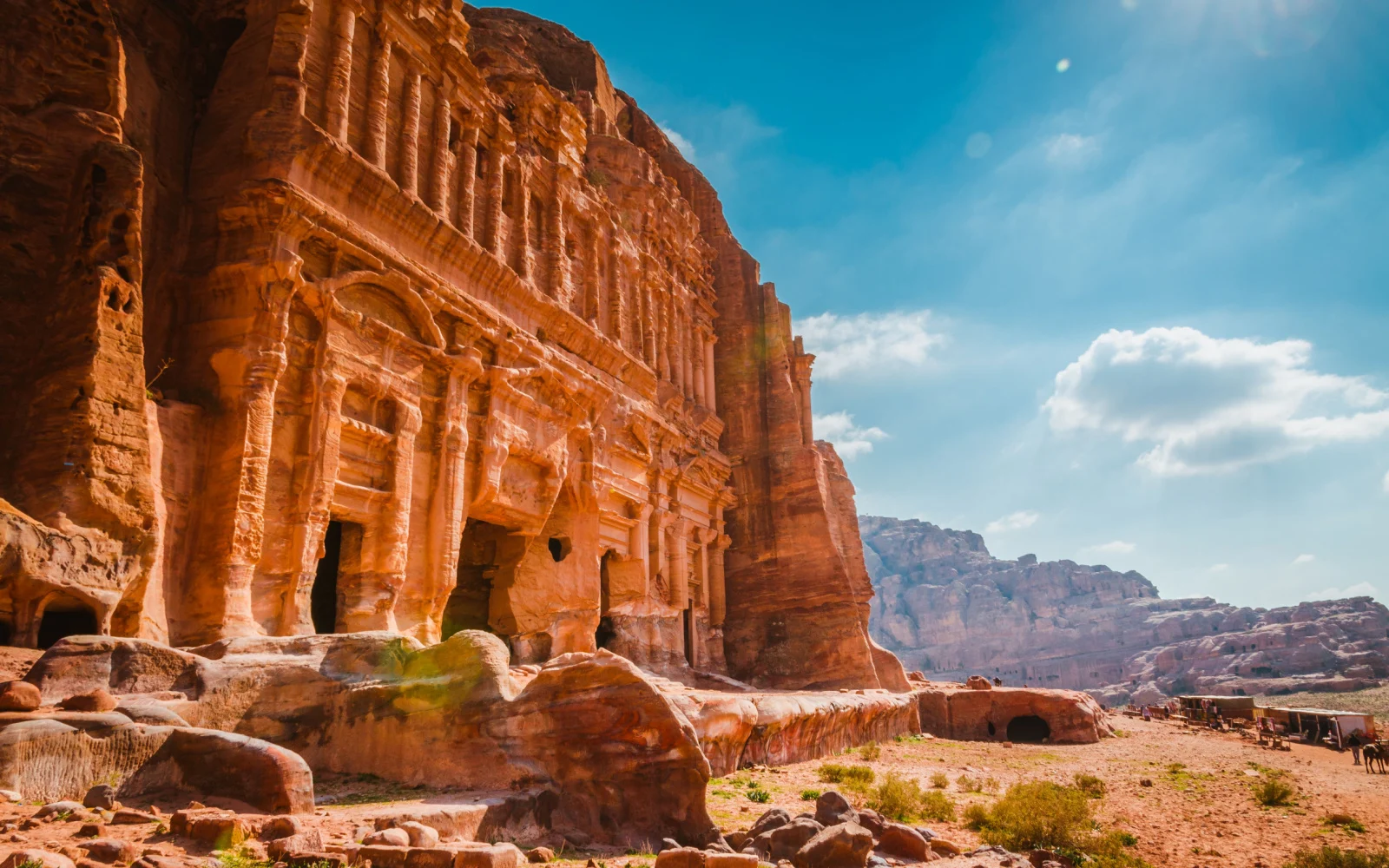Is Jordan safe to visit?
Yes, Jordan is generally safe for travelers, but caution is advised due to threats like theft, scams, and terrorism, as well as its proximity to conflict zones like Syria and Iraq. Visitors should be mindful of regional instability, avoid border areas and refugee camps, and stay clear of demonstrations due to the country’s political climate. We also recommend staying away of weather conditions, especially during the rainy season.
Jordan is one of the most popular destinations in the Middle East for those who seek destinations full of history. Jordan has attractions dating back thousands of years, such as the UNESCO-protected ancient city of Petra, carved into the desert stone.
Besides Petra, the country boasts the Roman ruins in the capital Amman, important religious sites such as the Baptism Site, where people speculate Jesus was baptized, and many desert castles. Plus, there are natural beauties such as the Dead Sea and the dramatic desert landscapes of Wadi Rum.
Another reason why Jordan is so popular among visitors is that it has a reputation for being one of the safest countries in the Middle East. But do the facts back this up? Find out below.
Is Jordan Safe to Visit?
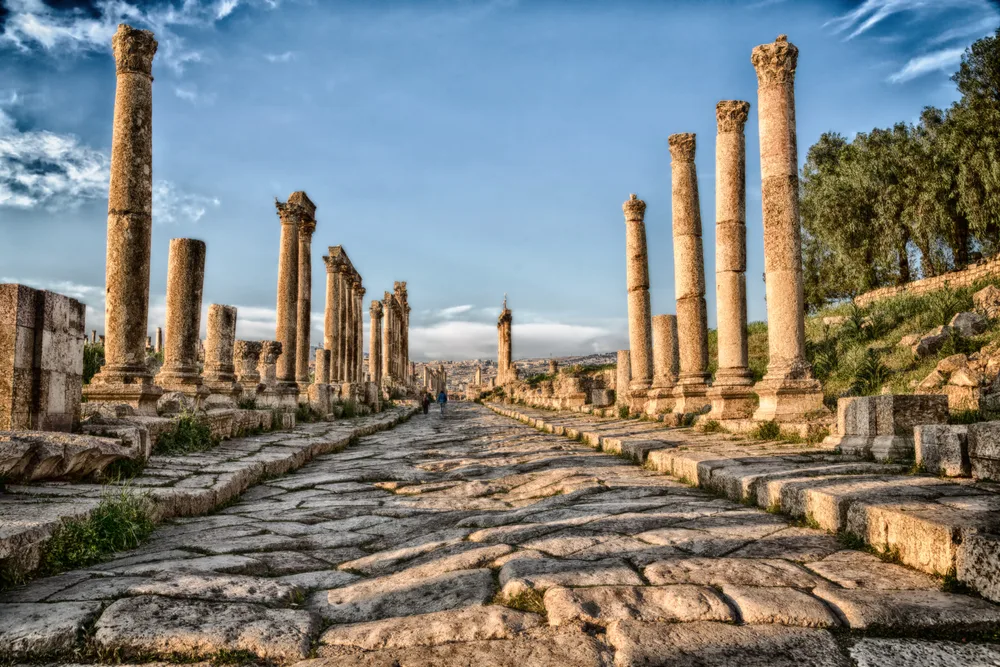
Ikpro/Shutterstock
Yes. Jordan is mostly a safe country to visit, but visitors should take some precautions when coming to town and avoid certain areas. The regional dangers affect Jordan as well.
Most travel advisories agree that Jordan is safe to visit but that visitors should also keep their wits about them while in town. The United States issues a Level Two travel advisory for the country, advising its citizens to exercise increased caution.
Most other countries have the same travel advisory level. Problems frequently mentioned in travel advisories for Jordan include:
- Petty theft
- Scammers
- Fraud
- Robbery
- Assault
- Terrorism
Although Jordan is a safe country, it borders several countries that are dealing with serious security challenges. Syria to the north has been in the throes of civil war for over a decade, while Iraq to the east has been unstable for years as well.
The areas near the border should be avoided because unrest tends to spill over. Jordan also has many refugee camps hosting people fleeing regional conflicts, some decades old, showing how the regional situation impacts the country.
These refugee camps should be avoided since they tend to have higher rates of crime due to their neglect. Jordan also borders Israel/Palestine, which means that the recent war in that area has affected Jordan somewhat. The border with Israel and the West Bank is subject to closures at a moment’s notice.
There have been frequent protests in Jordan due to this conflict, as over 50% of Jordanians have some Palestinian background. Protests are mostly peaceful but take on frequent anti-Western tones.
As a tourist, it’s always a good idea to avoid any demonstrations just in case things get out of hand. Natural disasters in Jordan aren’t that common, but it’s still a good idea to have some awareness about wild weather.
November to March is the country’s rainy season, and flash floods affect desert areas, including the popular destination of Petra.
Check up on the weather forecast before you go. Overall, Jordan is a fairly safe country despite the security challenges in the region. Still, it’s a good idea to keep some awareness about politics as you travel.
Crime in Jordan
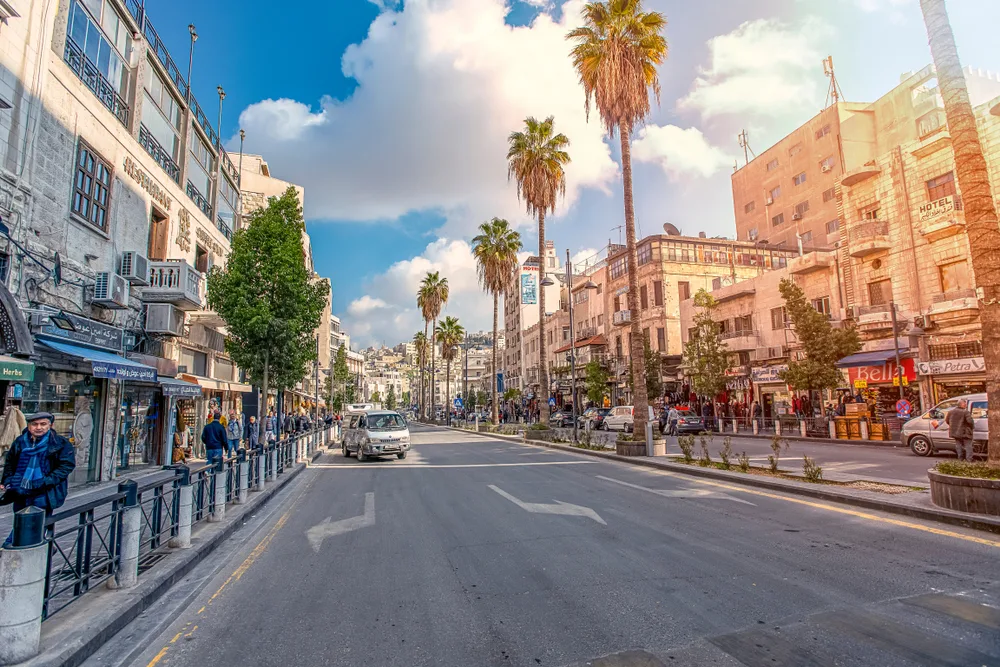
19/02/2019 Amman, Jordan, dirty streets of the Arab capital with a lot of people and cars on a sunny day in Ramadan, Jordan/Leshiy985/Shutterstock
Jordan has a moderate crime rate. While problems can occur as you are out and about, most incidents are non-violent property crimes. More serious incidents don’t tend to involve tourists.
In 2022, Jordan reported 1,256 crimes against people, which is a category of crime that includes murder, assault, and abuse. This is a rate of 11 incidents per 100,000 people, which is moderate but much lower than in the rest of the region.
The homicide rate alone is very low. According to World Bank data, the murder rate is just one incident per 100,000 people. Property crimes are far more common in Jordan than violent crimes.
The robbery rate is 6.1 incidents per 100,000 people. Rates of petty theft are hard to document since most people don’t bother to report these crimes to the police since they are so common. However, we know that most property crimes and theft occur nonviolently.
Jordan experienced an increase in crime in 2022. Overall crime increased, as did specific types of crime such as car theft and fraud. However, this is part of the global trend of crime increasing after COVID-19 lockdowns.
Petty Theft
The most common crime tourists are likely to encounter in Jordan is forms of petty theft, such as pickpocketing, bag snatching, scams, and fraud. The Canadian government warns about the risk of petty theft while visiting Jordan.
Although the crime rate is much lower than in most other places in the region, it still occurs, often in popular tourist areas such as Amman and Petra. Just make sure that you don’t flash valuables and you put them in a secure place, such as a zipped bag. Basic care is enough to deter most thieves.
Bag snatching is common, so be careful if you are carrying a purse or bag. Carry it in a way that is hard to snatch, such as across your body, and don’t leave bags unattended.
Scammers often target tourists. The Australian government mentions the risk of this type of crime in its travel advisory. Scammers often target foreign women, promising love or marriage, then scam their victims out of large sums of money.
Beware of someone showing too much interest in you, especially in areas notorious for scammers, such as Petra. Credit card fraud is another common form of scam, so be careful when you are taking money out from ATMS to only use reputable ones.
Terrorism
Terrorism is the crime most commonly mentioned in travel advisories for Jordan, although it is far from the most common crime in the country. Still, it’s a good idea to be aware of the risks.
According to the UK government’s travel advisory, terrorist attacks are likely in Jordan, and targets may include popular tourist attractions and hotels. Recent terrorist incidents include a 2019 knife attack in the popular tourist site of Jerash that injured several people.
The good news is that the Jordanian government has invested considerable resources into counter-terrorism measures.
Security throughout the country is very high, especially at likely targets such as airports. You’ll see armed officers walking around often. Make sure you follow all instructions from security personnel, as they are there to keep you safe.
Avoiding Bad Areas
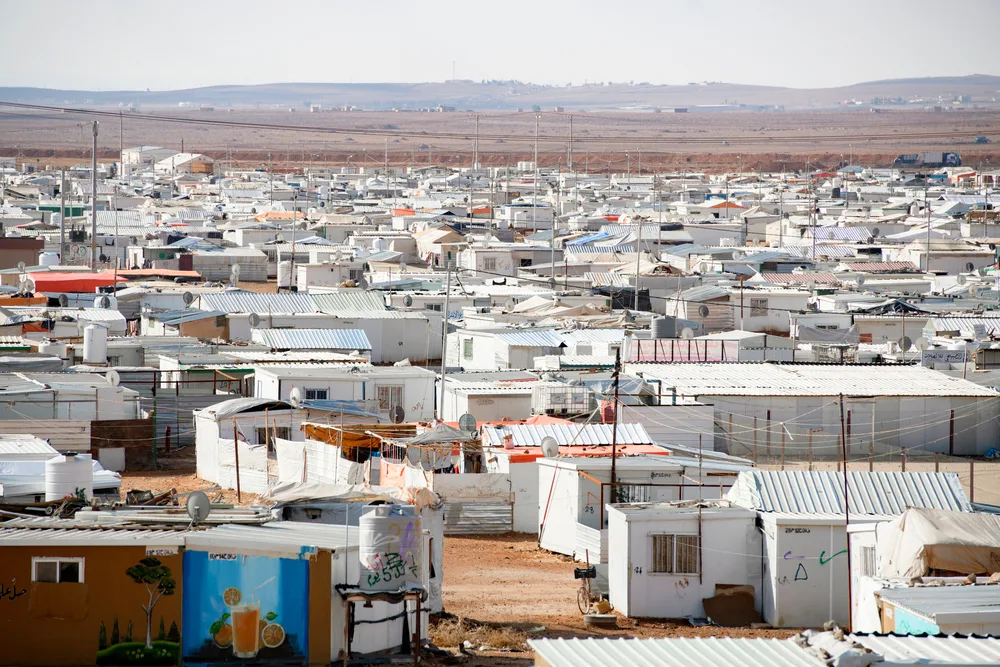
A view of Zaatari refugee camp. Zaatari located in north Jordan close to the border Syria . Jordan on 2018-12-15/Richard Juilliart/Shutterstock
Certain areas of Jordan have higher security challenges than others. Avoid the border areas with Syria, Iraq, and Israel/Palestine, where security challenges are more common.
Unless you have a reason to visit, avoid the refugee camps, as there are often security problems. Some parts of Jordan have higher crime rates, such as:
- Ma’an
- Rusayfah
- Baqa’a (in Ayn Basha)
- Ruwaished and areas to the east
Things to Consider
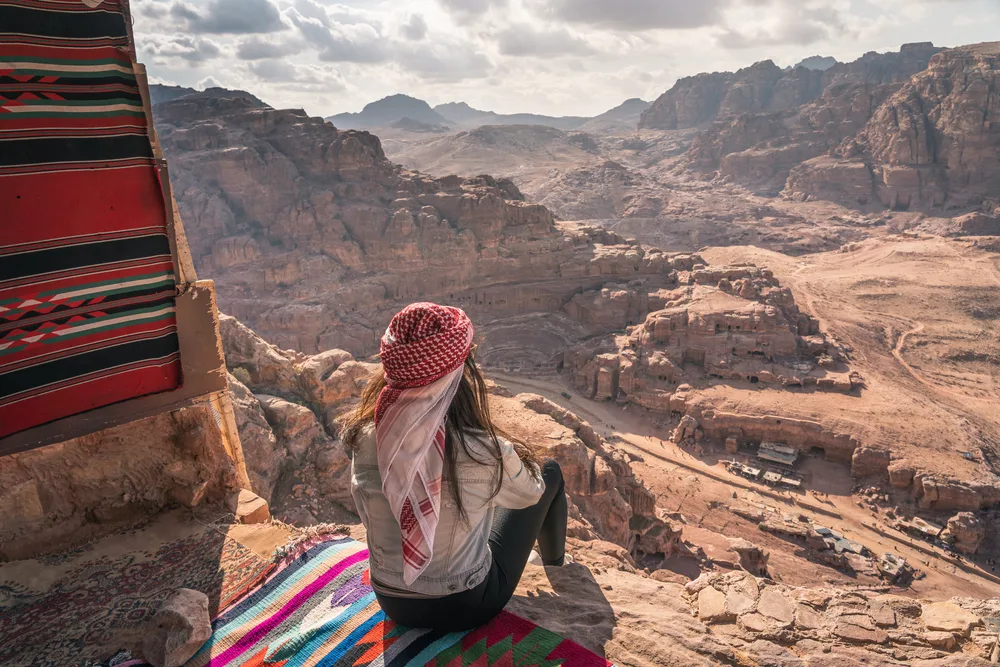
Punnawit Suwattananun/Shutterstock
Here are some additional safety tips to keep in mind when visiting Jordan:
- Women need to take additional care. Although Jordan is one of the safer Middle Eastern countries for women, female travelers are still faced with harassment and sometimes assault. Don’t share travel plans with strangers, and avoid walking alone at night.
- Remember that Jordan is still a Muslim country, although it is more liberal than its neighbors. Certain things, such as LGBT relationships, are still illegal. During Ramadan, visitors are expected to be respectful and not drink or eat in public, and buying alcohol is not allowed.
- Respect local laws. Drugs are highly illegal in Jordan. Don’t photograph government buildings or military installations.
Frequently Asked Questions
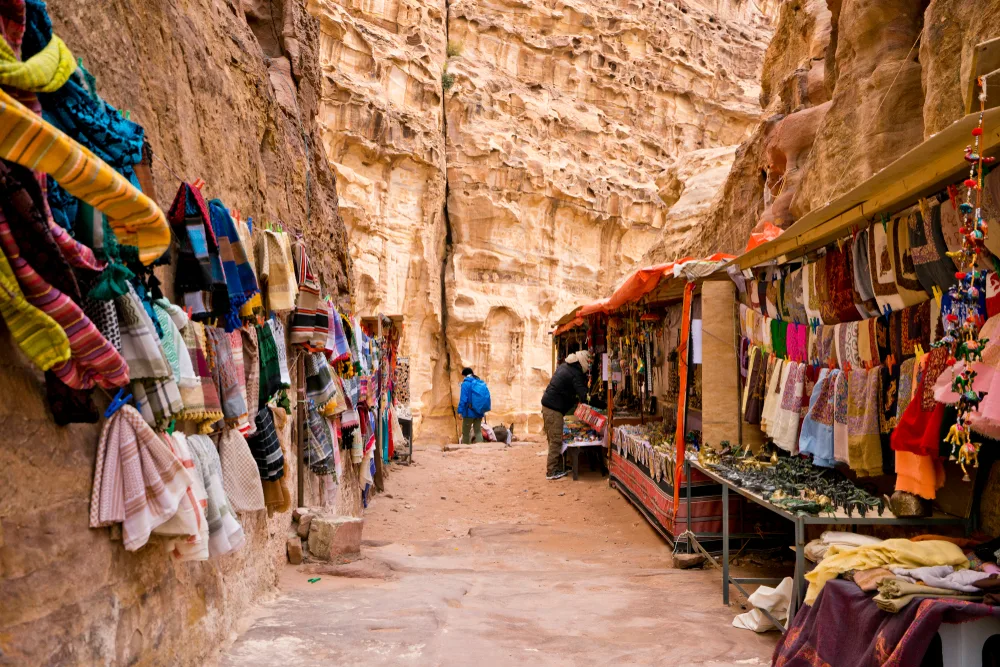
Huey Min/Shutterstock
Here are a few common questions that can help with planning your trip:
Is it currently safe to travel to Jordan?
Yes, Jordan is safe to visit right now. However, you can expect protests and tension as long as the conflict in Gaza is still ongoing.
Is it safe to visit Petra in Jordan?
Yes, Petra is safe to visit. You just have to be careful of petty thieves and scammers who tend to target tourists while you are there.
Is it safe to walk in Jordan?
Walking in Jordan is safe and one of the best ways to get to know its cities. Female travelers should be prepared for harassment, though, especially at night.
Is it safe to travel to Jordan as a woman?
Women are safe when traveling to Jordan but may face unwanted attention. Practice ignoring catcalls and not sharing intimate details with strangers.
Is Wadi Rum safe?
Wadi Rum is a safe place to visit! However, keep in mind that you are going into the desert. Whenever you head into the desert, you need to prepare by taking plenty of food and water (more water than you think you’ll need) and making sure that someone knows where you are in case of an emergency.
So, Is Jordan Safe to Visit?
Despite the security challenges facing almost all of its neighbors, Jordan is safe to visit. While regional problems affect Jordan in the form of a large refugee population, protests, and occasional danger at its borders, overall, the country is safe.
The most common danger tourists have to face while in Jordan is petty theft, which is easily avoidable with the right precautions. So, with so much to see and do, what are you waiting for — book your trip today!



